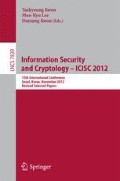Abstract
The unconditionally secure Distributed Oblivious Transfer (DOT) protocol presented by Blundo, D’Arco, De Santis, and Stinson at SAC 2002 allows a receiver to contact k servers and obtain one out of n secrets held by a sender.
Once the protocol has been executed, the sender does not know which secret was selected by the receiver and the receiver knows nothing of the secrets she did not choose. In addition, the receiver’s privacy is guaranteed against a coalition of k − 1 servers and similarly, the sender’s security is guaranteed against a coalition of k − 1 servers. However, after the receiver has obtained a secret, she is able to learn all secrets by corrupting one server only. In addition, an external mechanism is required to prevent the receiver from contacting more than k servers.
The one-round DOT protocol we propose is information-theoretically secure, allows the receiver to contact k servers or more, and guarantees the sender’s security, even if the receiver corrupts k − 1 servers after having obtained a secret.
Access this chapter
Tax calculation will be finalised at checkout
Purchases are for personal use only
Preview
Unable to display preview. Download preview PDF.
References
Beaver, D.: Commodity-based cryptography. In: Proceedings of the Twenty-Ninth Annual ACM Symposium on Theory of Computing, pp. 446–455. ACM (1997)
Beimel, A., Chee, Y.M., Wang, H., Zhang, L.F.: Communication-efficient distributed oblivious transfer. Journal of Computer and System Sciences 78(4), 1142–1157 (2012)
Bennett, C.H., Brassard, G., Crépeau, C., Skubiszewska, M.-H.: Practical Quantum Oblivious Transfer. In: Feigenbaum, J. (ed.) CRYPTO 1991. LNCS, vol. 576, pp. 351–366. Springer, Heidelberg (1992)
Blundo, C., D’Arco, P., De Santis, A., Stinson, D.R.: New Results on Unconditionally Secure Distributed Oblivious Transfer. In: Nyberg, K., Heys, H.M. (eds.) SAC 2002. LNCS, vol. 2595, pp. 291–309. Springer, Heidelberg (2003)
Blundo, C., D’Arco, P., De Santis, A., Stinson, D.R.: On Unconditionally Secure Distributed Oblivious Transfer. Journal of Cryptology 20(3), 323–373 (2007)
Brassard, G., Crépeau, C., Robert, J.M.: All-or-Nothing Disclosure of Secrets. In: Odlyzko, A.M. (ed.) CRYPTO 1986. LNCS, vol. 263, pp. 234–238. Springer, Heidelberg (1987)
Cover, T.M., Thomas, J.A.: Elements of Information Theory, 2nd edn. John Wiley & Sons, Inc., Hoboken (2006)
Even, S., Goldreich, O., Lempel, A.: A Randomized Protocol for Signing Contracts. Communications of the ACM 28, 637–647 (1985)
Gao, S.: A new algorithm for decoding Reed-Solomon codes. In: Bhargava, V.K., Poor, H.V., Tarokh, V., Yoon, S. (eds.) Communications, Information and Network Security, pp. 55–68. Kluwer Academic Publishers (2003)
Gertner, Y., Malkin, T.: Efficient Distributed (n choose 1) Oblivious Transfer. Tech. rep., MIT Lab of Computer Science (1997)
Naor, M., Pinkas, B.: Distributed Oblivious Transfer. In: Okamoto, T. (ed.) ASIACRYPT 2000. LNCS, vol. 1976, pp. 205–219. Springer, Heidelberg (2000)
Nikov, V., Nikova, S., Preneel, B., Vandewalle, J.: On Unconditionally Secure Distributed Oblivious Transfer. In: Menezes, A., Sarkar, P. (eds.) INDOCRYPT 2002. LNCS, vol. 2551, pp. 395–408. Springer, Heidelberg (2002)
Rabin, M.O.: How to Exchange Secrets with Oblivious Transfer. Tech. rep., Aiken Computation Lab, Harvard University (1981)
Reed, I., Solomon, G.: Polynomial codes over certain finite fields. Journal of the Society for Industrial and Applied Mathematics 8(2), 300–304 (1960)
Rivest, R.L.: Unconditionally Secure Commitment and Oblivious Transfer Schemes Using Private Channels and a Trusted Initializer (1999) (unpublished manuscript)
Shamir, A.: How to Share a Secret. Communications of the ACM 22(11), 612–613 (1979)
Shannon, C.E.: A Mathematical Theory of Communication. Bell System Technology Journal 27, 379–423, 623–656 (1948)
Author information
Authors and Affiliations
Editor information
Editors and Affiliations
Rights and permissions
Copyright information
© 2013 Springer-Verlag Berlin Heidelberg
About this paper
Cite this paper
Corniaux, C.L.F., Ghodosi, H. (2013). An Information-Theoretically Secure Threshold Distributed Oblivious Transfer Protocol. In: Kwon, T., Lee, MK., Kwon, D. (eds) Information Security and Cryptology – ICISC 2012. ICISC 2012. Lecture Notes in Computer Science, vol 7839. Springer, Berlin, Heidelberg. https://doi.org/10.1007/978-3-642-37682-5_14
Download citation
DOI: https://doi.org/10.1007/978-3-642-37682-5_14
Publisher Name: Springer, Berlin, Heidelberg
Print ISBN: 978-3-642-37681-8
Online ISBN: 978-3-642-37682-5
eBook Packages: Computer ScienceComputer Science (R0)

